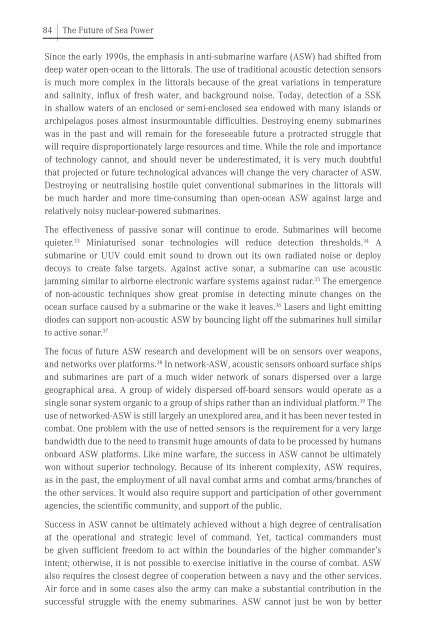THE FUTURE OF SEA POWER
SPC2015_Proceedings
SPC2015_Proceedings
You also want an ePaper? Increase the reach of your titles
YUMPU automatically turns print PDFs into web optimized ePapers that Google loves.
84 |<br />
The Future of Sea Power<br />
Since the early 1990s, the emphasis in anti-submarine warfare (ASW) had shifted from<br />
deep water open-ocean to the littorals. The use of traditional acoustic detection sensors<br />
is much more complex in the littorals because of the great variations in temperature<br />
and salinity, influx of fresh water, and background noise. Today, detection of a SSK<br />
in shallow waters of an enclosed or semi-enclosed sea endowed with many islands or<br />
archipelagos poses almost insurmountable difficulties. Destroying enemy submarines<br />
was in the past and will remain for the foreseeable future a protracted struggle that<br />
will require disproportionately large resources and time. While the role and importance<br />
of technology cannot, and should never be underestimated, it is very much doubtful<br />
that projected or future technological advances will change the very character of ASW.<br />
Destroying or neutralising hostile quiet conventional submarines in the littorals will<br />
be much harder and more time-consuming than open-ocean ASW against large and<br />
relatively noisy nuclear-powered submarines.<br />
The effectiveness of passive sonar will continue to erode. Submarines will become<br />
quieter. 33 Miniaturised sonar technologies will reduce detection thresholds. 34 A<br />
submarine or UUV could emit sound to drown out its own radiated noise or deploy<br />
decoys to create false targets. Against active sonar, a submarine can use acoustic<br />
jamming similar to airborne electronic warfare systems against radar. 35 The emergence<br />
of non-acoustic techniques show great promise in detecting minute changes on the<br />
ocean surface caused by a submarine or the wake it leaves. 36 Lasers and light emitting<br />
diodes can support non-acoustic ASW by bouncing light off the submarines hull similar<br />
to active sonar. 37<br />
The focus of future ASW research and development will be on sensors over weapons,<br />
and networks over platforms. 38 In network-ASW, acoustic sensors onboard surface ships<br />
and submarines are part of a much wider network of sonars dispersed over a large<br />
geographical area. A group of widely dispersed off-board sensors would operate as a<br />
single sonar system organic to a group of ships rather than an individual platform. 39 The<br />
use of networked-ASW is still largely an unexplored area, and it has been never tested in<br />
combat. One problem with the use of netted sensors is the requirement for a very large<br />
bandwidth due to the need to transmit huge amounts of data to be processed by humans<br />
onboard ASW platforms. Like mine warfare, the success in ASW cannot be ultimately<br />
won without superior technology. Because of its inherent complexity, ASW requires,<br />
as in the past, the employment of all naval combat arms and combat arms/branches of<br />
the other services. It would also require support and participation of other government<br />
agencies, the scientific community, and support of the public.<br />
Success in ASW cannot be ultimately achieved without a high degree of centralisation<br />
at the operational and strategic level of command. Yet, tactical commanders must<br />
be given sufficient freedom to act within the boundaries of the higher commander’s<br />
intent; otherwise, it is not possible to exercise initiative in the course of combat. ASW<br />
also requires the closest degree of cooperation between a navy and the other services.<br />
Air force and in some cases also the army can make a substantial contribution in the<br />
successful struggle with the enemy submarines. ASW cannot just be won by better


